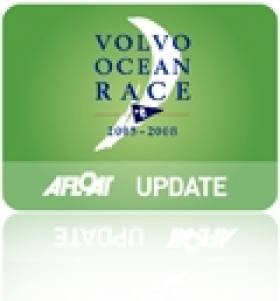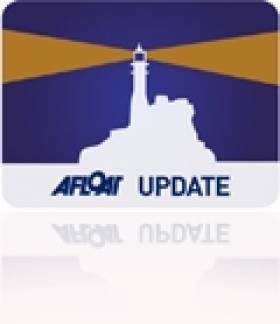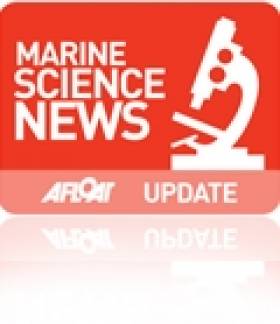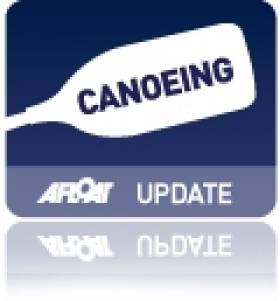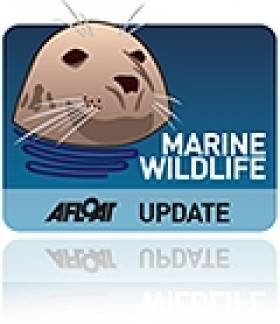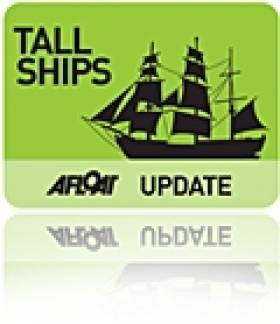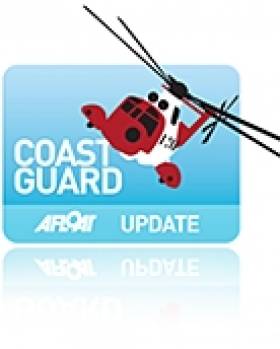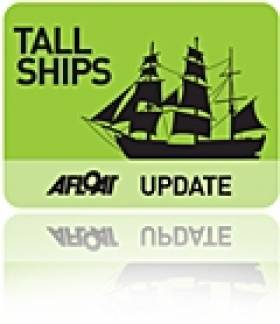Displaying items by tag: training
First Candidates For All-Female VOR Team Sail to Lanzarote
#VOR - The first candidates for places on Team SCA's all-female team for the next edition of the Volvo Ocean Race are currently sailing on a training leg from Southampton to Lanzarote.
The Volvo Ocean Race website spoke to one of the hopefuls, Vendee Globe veteran Sam Davies, who described the team's plans to field the first women-only team in the VOR as "an amazing opportunity for me and woman's sailing in general, especially for women ocean racers."
She's joined on the VOR 70 training vessel - which sports the team's recently unveiled livery ahead of the completion of their VOR 65 yacht - by fellow Brit sailor Annie Lush, Carolijn Brouwer and Klaartje Zuiderbaan from the Netherlands, Jeanne Gregoire from France, and Liz Wardley and Stacey Jackson from Australia.
Davies said of the team selection that it's "a two-way process... the managers are looking at all of us and we're testing it out to see if it is really what we want to do."
Team SCA managing director Richard Brisus said of the first trainee voyage to the team's base at Puerto Calero: "We have set out to work with the world’s best female offshore sailors and create a strong group of women that also has the ability to work well together as a high-performing team."
A second group of candidates will head out to sea shortly, and Team SCA coach Magnus Olsson said it "would be fantastic if we could find our team from these two groups.
“They are a remarkable group of women and each brings a very high level of skill sets to a potential team."
'Unique Opportunity' To Join 2013 Fastnet Race
#FastnetRace - UK-based Global Sailing is offering what it calls a "unique opportunity" to race in the 2013 edition of the Rolex Fastnet Race.
"Forget the concept of 'just taking part' and join a team dedicated to racing hard," says the company's website. "We do not require any previous experience but we need enthusiasm, commitment and fitness."
Full training in racing and sailing techniques comes with the race package, from helming and sail trim to boat handling and preparation, tactics and navigation.
For a crew berth fee of €3,840 (€4,489), prospective crew will take part in a training weekend in the Solent in April, as well as four qualifying races - including the Cervantes Trophy between Cowes and Le Havre - and the Fastnet Race itself.
The fee also covers a sea survival course, return passage to Cowes, use of all safety equipment and foul weather clothing, all food and drink on board during training and racing, and other general expenses.
Full details are available at the Global Sailing website HERE.
Places Open On Science@Sea Training Courses for Marine Students
#MARINE SCIENCE - The Strategic Marine Alliance for Research and Training (SMART) has opened the call for applications for Science@Sea research vessel-based training courses aimed at students of marine-related sciences.
Science@Sea courses have been running since 2008 and are recognised by the Institute of Marine Engineering, Science and Technology (IMarEST) as a means of contributing towards a student’s professional development and career.
The two-day training courses will be held between 7 and 12 November 2012 in waters off Cork and will offer students the opportunity to gain practical, hands-on experience onboard the national research vessel RV Celtic Voyager.
"Science@Sea is unique in that it gives students of marine related sciences a complete guide to working at sea," said SMART national co-ordinator Dr Paulha McGrane. "This not only increases national capacity in carrying out research survey operations but provides graduates with a competitive edge on the national and international jobs market.”
Dr McGrane explained that Science@Sea focuses on practical, cross-disciplinary skills such as sample collection and processing, operation of equipment and instrumentation, and data acquisition and processing.
"Other areas we look at, which are essential to working at sea, include survey design and planning, safety at sea, and post-survey analysis and assessment. To date, students who have participated in Science@Sea have found the course of enormous benefit in securing employment."
Course dates are as follows:
- Postgraduates: 7-8 November 2012
- Undergraduates 1: 9-10 November 2012
- Undergraduates 2: 11-12 November 2012
Applications for Science@Sea and posters advertising the course are available online HERE. Completed applications should be received no later than Friday 5 October 2012.
Please note an administration fee of €50 applies and participants are liable for their own transportation and accommodation costs in Cork. For queries relating to any aspect of the course, contact [email protected]
Science@Sea is provided by SMART, a marine science partnership programme that provides quality offshore training for students of marine science, technology and engineering. The programme is carried out under the Sea Change strategy with the support of the Marine Institute and the Marine Research Sub-programme of the National Development Plan 2007–2013. Core partners include the National University of Ireland, Galway; University College Cork; Galway-Mayo Institute of Technology; Cork Institute of Technology; the National Maritime College; and the Marine Institute; with additional funding by the Higher Education Authority.
Junior Summer Camps with Canoeing Ireland
#CANOEING - With Ireland's schoolkids well into their summer holidays, a great way to keep them amused is to get them enrolled in Canoeing Ireland's junior summer camps.
Junior camps run every week at Canoeing Ireland's purpose-built training centre at Strawberry Beds from Monday to Friday over five two-hour sessions from 10am-12om or 2pm-4pm, teaching basic canoeing skills mixed with lots of fun and games.
The camps cost just €60 per child per week and are suitable for all. No experience is necessary, and all equipment can be provided.
For more information contact Canoeing Ireland at 01 625 1105 or e-mail [email protected].
ISAF Posts Review of Development Symposium
#DEVELOPMENT - The International Sailing Federation's (ISAF) inaugural Development Symposium at Howth Yacht Club recently "promised much in the way of passionate discussion", according to its review of the two-day event.
Presentations were given by Tony Wright, training manager of the Irish Sailing Association, who outlined the ISA's national programme that keeps the focus of the sailor "at the centre of all that they do"; and Simon Jinks who walked through his new Guide to Offshore Personal Safety for Cruising and Racing.
Meanwhile, World Youth Sailing Trust coach Hugh Styles spoke on the subject of cohesive training programmes adding value to international events and leaving a legacy for host nations and teams alike.
Participants from the federation's member nations kept an 'ideas bank' which listed development ideas for future consideration, including a proposal for a development forum for sailing coaches, and using the model of the European Qualifications Framework as a reference for coaching competencies.
New Zealand, South Africa, Iceland and Turkey were also suggested as locations for future symposiums.
For more see the full review of the Development Symposium at the ISAF website HERE.
#MARINE WILDLIFE - The Limerick branch of Birdwatch Ireland is seeking volunteers to assist in rescuing birds from oil spillages in the Shannon Estuary.
A report in the Limerick Post recounts a recent meeting at Shannon Rowing Club, where Birdwatch Ireand highlighted the impact on the environment and marine wildlife from both major and minor oil spills.
The meeting also discussed the role that local birdwatchers can play in determining crucial spillage incident response times.
A training exercise at Poulnasherry Bay is being organised for next month using equipment donated to the Irish Seal Sanctuary, preceeded by a similated planning exercise and "on-the-ground response".
The Irish Seal Sanctuary will also provide opportunities for training in the rehabilitation and cleaning of spillage-affected birds.
The Limerick Post has much more on this story HERE.
Dublin Hosts First ISAF Development Symposium in March
#DEVELOPMENT - Representatives from the International Sailing Federation's member nations throughout the world will meet at Howth Yacht Club from 17-18 March for the inaugural ISAF Development Symposium.
The aim of the two-day conference is to develop the criteria and future strategy for sail training and development within the governing body of world sailing, based on three core requirements:
- Fulfilling requirement set out in the ISAF Constitution to develop the sport and increase participation;
- Providing a structure for the sport to grow to meet expectations of the International Olympic Committee; and
- Supporting member nations in growing the sport in their own countries.
"Training is the key that will unlock and secure the future for our sport," said the ISAF in its development statement at the federation's annual conference last year.
Dublin was chosen as the host location for this first symposium as it will be hosting the ISAF Youth Worlds in July, just before the 2012 Olympic Games in London.
The international delegates, chaired by event organiser and ISAF training and development manager Dan Jaspers, will be supported by a group of ISAF representatives such as vice president Nazli Imre, development and youth committee chairman Olivier Bovyn, ISAF-nominated experts and the World Youth Sailing Trust coach, as well as invited specialist technical advisors.
More information about the ISAF Development Symposium is available HERE.
Tall Ships Training Opportunities for Young People Across Ireland
#TALL SHIPS - The organisers of the Tall Ships Races visit to Dublin are inviting young people to get involved by becoming 'trainees' aboard the fleet as they race from Spain to Ireland this summer.
The 18 ships (as of last November) are set to sail from A Coruña in northern Spain to Dublin on the final leg of this year's race over an estimated ten-day period from 13-23 August.
Young people across Ireland can now apply to be trainees on board the tall ships and take part in a voyage as crew. No previous experience is necessary.
Open information days are planned for this weekend from tomorrow (Friday) 17 February to Sunday 19 February from 12pm to 6pm daily at the CHQ building in the IFSC, close to the Jeannie Johnston museum.
Anyone that is interested in taking part or receiving further information can register at www.dublintallships.ie/trainees/
Meanwhile, organisers are also making funding available for the young people of the capital.
The Dublin City Tall Ships Funding will cover the costs of 25 trainees from Dublin to sail on the ships as they race from Spain.
Any youth organisation within Dublin City Council Administrative Area can nominate members of their organisation. Alternatively, individuals may apply and seek the nomination of a youth organisation such as a youth group or community group; school or college; sports club or Scouts group.
Details about this funding programme and other opportunities are included in the information bulletin attached below.
For further information contact trainee recruitment officer Michael Byrne at [email protected].
Coastguard Takes Delivery of New Chopper
#COASTGUARD - The Irish Coast Guard has taken delivery of its new search and rescue helicopter at its Shannon base, The Irish Times reports.
As previously reported on Afloat.ie, Sikorsky completed production of the new S-92 helicopter for the Irish Coast Guard last December under the rescue service's €500 million deal with CHC Ireland to revamp the aircraft fleet.
The deal will also see the coastguard's remaining four Sikorsky S-61s replaced by second-hand S-62s from Scotland over the coming months.
Training with crews at Shannon is set to begin shortly ahead of the S-92's first public demonstration at the centenary of the Titanic’s departure from Cobh in Cork Harbour.
Meanwhile, it is expected that the Air Corps may be offered an upgraded air ambulance role, after they were ruled out as contenders for search and rescue work amid some controversy.
The Department of Health has reportedly been in exploratory talks with private firms regarding the provision of an inter-hospital emergency air transfer service, as called for by the Roscommon Hospital Action Group.
The Irish Times has more on the story HERE.
IWDG Secures 75% Funding for Celtic Mist Refit
#TALL SHIPS - The Irish Whale and Dolphin Group (IWDG) has secured three-quarters of the funding it required to refit its research vessel Celtic Mist.
According to The Irish Times, the Clare Local Development Company has approved the allocation of a €48,000 grant towards the refurbishment of the ketch.
The work will be carried out by Cathal Blunnie and several sub-contractors, and involves stripping down the main cabin and removing the bath and shower to increase space for crew berths.
While the ship's clock will be retained, the ship’s wheel in the main cabin will be removed and presented to the Haughey family as a gesture of appreciation.
As previously reported on Afloat.ie, the 52-foot yacht - which was gifted by the Haughey family to the IWDG to assist in its marine wildlife conservation work - entered dry dock last November in preparation for the refit work, after relocating to its new berth at Kilrush, Co Clare in July.
This followed its last jaunt at sea in its former guise, completing a leg of the Tall Ships Races from Waterford to Greenock in Scotland.
The cost of refurbishing the yacht for research and training purposes is expected to top €60,000, with an annual running cost of some €20,000, for which the IWDG is seeking ongoing financial assistance.
The group aims to get the Celtic Mist back at sea before the summer.


























